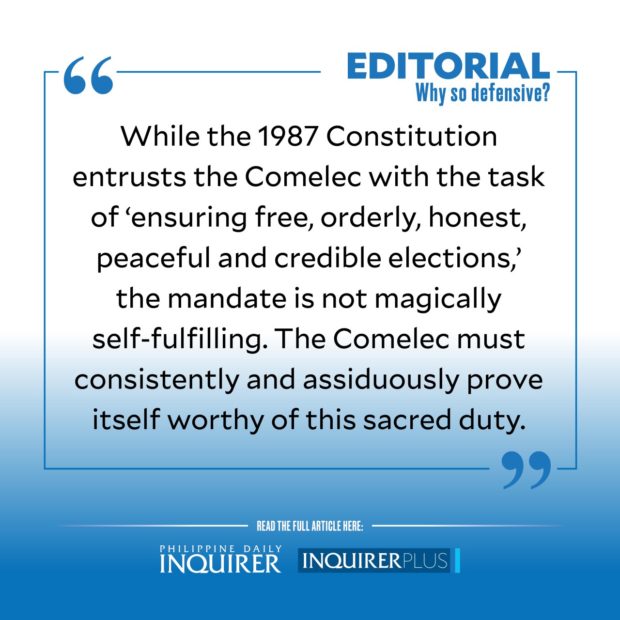Commission on Elections (Comelec) Commissioners Rey Bulay and Socorro Inting made headlines last week for expressing their displeasure at certain statements made about the poll body and the 2022 elections, with Bulay even threatening to send people to jail. What country are these commissioners living in, one wonders.
Inting had singled out the Asian Institute of Management Alumni for Leni Robredo, which called on the Comelec, the Department of Education and its deputized agencies, the Philippine National Police, and the Armed Forces of the Philippines, to be nonpartisan, to make the elections safe and to “protect the will of voters as expressed in the ballot.”
“Our collective interest is for our candidates to be elected through a credible process. When elections are credible, the results will be accepted and the transition to the new government will be peaceful and orderly,” the group said.
People in their right mind would think the statement par for the course in any hotly contested election, such as this one, just to put the authorities on notice that voters are watching and expecting them to do their job well.
But no. For Inting, such a call was “unnecessary as it tends to sow distrust on the integrity of the Comelec.” Worse, she bristled, the appeal “subtly conditions the minds of Filipinos that the upcoming elections [are] not credible should Vice President Leni Robredo lose in the presidential race.” Bulay then jumped in with this warning: “To those issuing public opinion that Comelec is biased or that it would cause election fraud, I am warning you that we would not hesitate to call upon the Armed Forces of the Philippines, which is now under Comelec control, to round you up and have you jailed.’’
Why be triggered by such calls for honesty? Did the reminder touch a sensitive nerve? As the common expression goes: offended much?
Was the Comelec perhaps reminded of its previous lapses that tended to cloud its integrity? Among them was the 2004 “Hello Garci” incident that had then President Gloria Arroyo prodding Commissioner Virgilio Garcillano to assure her of at least a million vote margin over her closest rival; the unexplained seven-hour glitch in the transmission of results in the 2019 elections; the long-running but futile 2016 election protest by Ferdinand Marcos Jr. against Vice President Robredo, and the delayed decision on the disqualification case of Marcos, Jr. Given such record, why begrudge people the right to put the Comelec under scrutiny?
In an online forum on Friday, the National Citizens’ Movement for Free Elections (Namfrel) and the Center for People Empowerment in Governance expressed alarm at the “lack of transparency” in the Comelec procedures and its automated election system (AES) provider Smartmatic. The two groups noted the closed-door printing of ballots, the lack of the required random manual audit, the limited source code review of the AES, and the lack of electronic signatures of teachers who will serve as part of the Board of Election Inspectors.
“Seventy percent of ballot printing was done unobserved,” Namfrel president Gus Lagman, a former Comelec commissioner, said.
At the start of the overseas absentee voting early this month, there were reports of pre-shaded ballots given to OFWs in Singapore and Dubai. But even before the Comelec could meet to verify the report, Commissioner George Garcia had dismissed the report as “fake news” and threatened prosecution against those spreading false information about electoral procedures. The Philippine embassy in Singapore later confirmed the incident as due to “a series of human errors” among embassy staff.
If people are jittery about these elections and the ability of the Comelec to be nonpartisan, blame it on the fact that all seven commissioners are appointees of President Duterte, whose daughter is the running mate of Marcos Jr. That Comelec awarded the contract to transport the counting machines and election paraphernalia to a logistics company owned by a friend and top campaign contributor of Mr. Duterte doesn’t ease the doubts any.
Then its recent missteps, such as rescinding a fact-checking contract with online news site Rappler due to pressure from Solicitor General Jose Calida, and the unfortunate postponement of the last leg of the presidential debates after its non-media contractor defaulted on its hotel payments. But why depart from its previous practice of partnering with established media organizations for the debates in the first place?
So instead of being piqued and spending its energy running after people exercising their freedom of expression and right to demand accountability of public officials, the Comelec should welcome these calls as part of the turf. Because while the 1987 Constitution entrusts the Comelec with the task of “ensuring free, orderly, honest, peaceful and credible elections,” the mandate is not magically self-fulfilling. The Comelec must consistently and assiduously prove itself worthy of this sacred duty.


